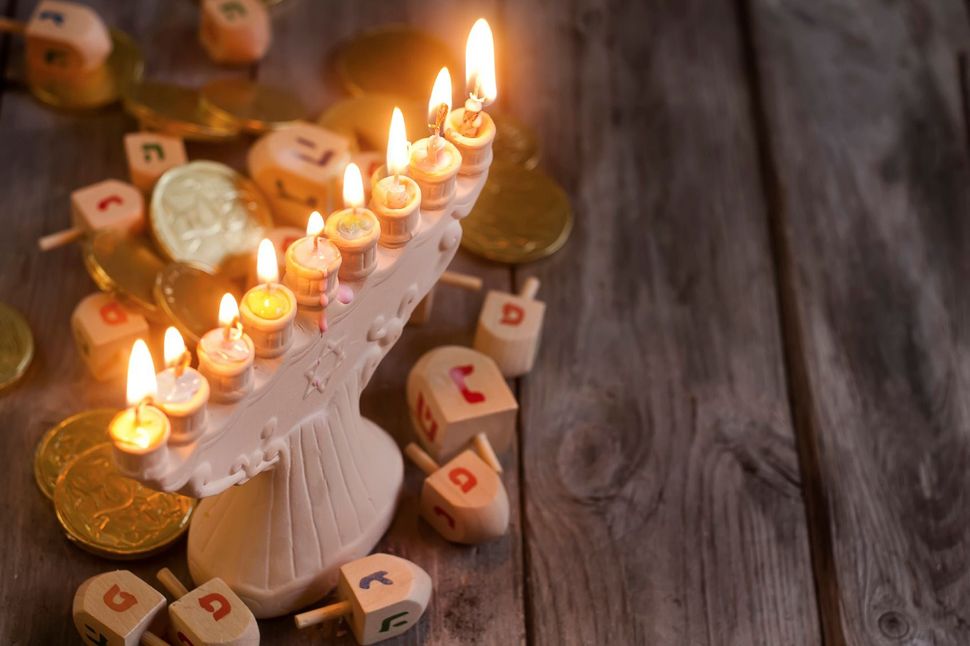Eight Lights to Keep Jewish Feminists Warm This Hanukkah

Image by istock
It’s dark outside.
I know, I’m stating the obvious. But this year, the darkness feels like it is swallowing me. It is not simply that it is often still pitch black when I wake up again the next morning, and already dark when I leave the Beit Midrash every night. This darkness is thick, obscuring my ability to see light around me. It is heavy, weighing on my shoulders each time I lean over another page of Talmud. It is the darkness of the proclamations made, denying my friends’ and colleagues’ right to do their life’s work. It is the darkness of articles written, comparing my commitment to Torah study to the . It is the darkness of accusations made against my community, yelled out by people who know nothing about us. It is the darkness of the divisions that tear at us, threatening to drive us apart at the moments when we most need to come together.
And yet. The promise of Chanukah is to bring light into the darkness — not only to find it, but also to create it ourselves. And so, with this obligation in mind, I offer up eight lights already burning in the dark world. Some are big and some are small. Some are individual and some are universal. All have the potential to change the Jewish community, and the world.
Light #1: I walk home hand-in-hand with my three-year-old nephew. As is often the case with him, we are discussing Judaism. This time, we are playing “name the rabbi,” listing all of the ones that he knows. After naming five or six, all women, he turns to me and says, “But Aunt Rachel, there can be boy rabbis too, right?” For him, the fact that the rabbis who teach him, sing with him, and show him how to love Torah happen to be female is the most natural thing in the world.
Light #2: Following the RCA’s resolution about female leadership, a listserve I am on for female Orthodox leaders lights up. Rather than focusing on anger and indignation, a consensus quickly emerges that the best thing we can do is learn. To date, more than 200 women have signed up complete the 314 chapters of the Talmud Bavli, which will culminate in a siyyum in January.
Light #3: A few weeks ago, I watched with pride as one of my students became a Bat Mitzvah. With grace, humility, and remarkable poise, she read almost the entire parsha and offered words of Torah that were both deeply sophisticated and authentically hers. Rather than seeing her Bat Mitzvah as a performance, she understood that her role was to lead the community and to facilitate their prayer experience. And for her, taking this role was completely natural, or even expected—something that could never have been said a generation ago.
Light #4: Each summer, at Drisha, I have the privilege to teach some of the most remarkable high school and college students I have ever met. They burn with the desire to learn Torah, and to affect change in their communities, whether professionally or as lay people. I have no doubt that with them at the healm, we will be in excellent hands.
Light #5: As I begin to think about writing my dissertation, I realize that I feel lost in a sea of articles, books and ideas. When I put out a call for advice and help, my fellow female Jewish Studies academics are the first to volunteer their help, their time, their thoughts, and their resources. As I thank them for their generosity, they shrug and say it was what the previous generation of female academics did for them. Despite the cutthroat nature of academia, rather than cutting each other down, the women in my community are working on building each other up.
Light #6: Somebody calls me about being a Scholar in Residence in their community. When I ask if they have a topic in mind, they ask what is interesting to me, rather than asking me to talk about something like “Women in the Talmud.” Although we are not nearly there yet, I realize that we are taking steps, however small, towards seeing our learned women simply as scholars, rather than women scholars.
Light #7: My friends and colleagues are out in the fielding serving the Jewish people, and they are simply extraordinary at doing so. Whether as rabbis, maharats, teachers, PhDs, informal educators, , foundation heads, or laypeople, they are reshaping and rebuilding a community that offers more meaning, more opportunities for connection, and more substance than ever before. Rather than worrying about the noise around them, they keep their heads down and do their jobs, winning hearts and minds every day. They are creating stronger, more vibrant Jewish communities every day.
Light #8: I am a woman, and I am getting a PhD in Talmud. Before that, I spent four years learning gemara and halakha full time. In the day to day struggle against the voices yelling “No! Can’t! Forbidden!” I sometimes forget how extraordinary this fact is. And yet, this amazing fact is my reality. And so I try to remember how lucky I am every day. I get to do something that almost no women got to do even a generation ago.
Yes, it is dark. But these lights are real, and they will continue to burn bright. They will burn brighter than the hatred and the anger and the voices that tell us no. They will multiply with each child who thinks female leadership is regular, with each teenager who commits herself to learning, with every woman who believes in the Torah that she has to teach. And hopefully, one day, they will blot out the darkness.





















